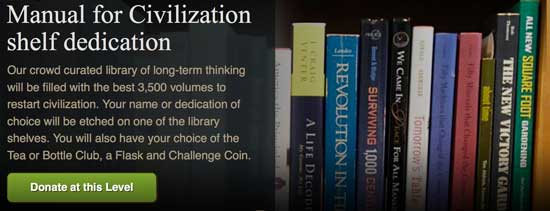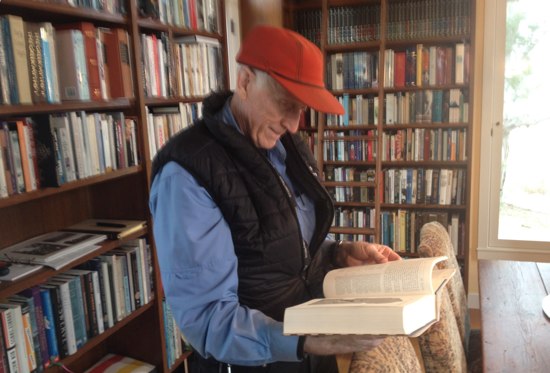
Stewart Brand’s Selected Books for the Manual for Civilization
Long Now’s Founding Board Member Stewart Brand suggested more than 70 volumes for our Manual for Civilization collection. The Manual will be housed within The Interval at Long Now, our new public space which opens to the public this Spring.
The 3500 books that comprise the Manual for Civilization will serve as the library component of The Interval. A dominant feature, seen immediately upon entering and even visible from outside, on shelves stretching floor to ceiling and set amongst the large scale mechanical prototypes of our 10,000-Year Clock, the Manual will present a compelling image for visitors to our space.
As construction of The Interval at Long Now nears completion, our fundraising continues. We are in the final stretch of the capital campaign to fund renovations to our San Francisco space that not only houses The Interval but also Long Now’s offices.
If this venue, its unique library, and all its other features capture your imagination, please consider a donation at any level. You can be a part of giving long-term thinkers a beautiful place to gather, full of amazing books. Also please spread the word to others you think would appreciate this project.
Writer, futurist, environmentalist and Long Now co-founder, Stewart Brand keeps three personal libraries. In the last month he walked us through all of them and carefully selected books for the list below. It is a remarkable list of titles old and new.
From the Epic of Gilgamesh to contemporary science fiction. Homer’s epics and Beowulf, Lao Tzu and Machiavelli. But also Brian Fagan’s The Long Summer: How Climate Changed Civilization and Thinking, Fast and Slow by Daniel Kahneman from 02011. There are many past Long Now Seminar speakers: Ian Morris, Jared Diamond, Steven Pinker and Verner Vinge to name only a few. And no less than 6 novels by the British Science Fiction author Iain M. Banks, who passed away last year.
Keep in mind that like Brian Eno’s list and others we’ll be posting soon, this is not intended as a standalone set of books, but as part of the larger corpus of thousands of texts that we are assembling. That collection will include submissions from Long Now members and the donors to our ‘brickstarter’ campaign to help build the Long Now’s Interval (formerly referred to as Long Now Salon).
Together these books assemble knowledge essential for us to maintain, extend and (if needed) recreate what humans have achieved thus far. Here are Stewart Brand’s recommendations:
- Dirt: The Erosion of Civilizations by David R. Montgomery
- Meditations by Marcus Aurelius
- The Odyssey by Homer translated by Robert Fagles
- The Iliad by Homer translated by Robert Fagles
- The Memory of the World: The Treasures That Record Our History from 1700 BC to the Present Day by UNESCO
- The History of the World in 100 Objects by Neil MacGregor
- The Landmark Herodotus: The Histories edited by Robert B. Strassler
- The Landmark Thucydides: A Comprehensive Guide to the Peloponnesian War edited by Robert B. Strassler
- The Complete Greek Tragedies, Volumes 1-4 edited by David Grene and Richmond Lattimore
- The Prince by Machiavelli, translated by George Bull, published by Folio Society
- The Nature of Things by Lucretius
- The Art of the Long View: Planning for the Future in an Uncertain World by Peter Schwartz
- The Way Life Works: The Science Lover’s Illustrated Guide to How Life Grows, Develops, Reproduces, and Gets Along by Mahlon Hoagland and Bert Dodson
- Venice, A Maritime Republic by Frederic Chapin Lane
- The Western Canon: The Books and School of the Ages by Harold Bloom
- The Map Book by Peter Barber
- Conceptual Physics by Paul G. Hewitt
- The Encyclopedia of Earth: A Complete Visual Guide by Michael Allaby and Dr. Robert Coenraads
- The Foundation Trilogy by Isaac Asimov
- Star Maker by Olaf Stapledon
- The Gift: Imagination and the Erotic Life of Property by Lewis Hyde
- Powers of Ten: About the Relative Size of Things in the Universe by Philip Morrison and Phylis Morrison
- The Elements: A Visual Exploration of Every Known Atom in the Universe by Theodore Gray
- The History of the Decline and Fall of the Roman Empire (6 Volumes) by Edward Gibbon
- The Complete Guide to Trail Building and Maintenance by Carl Demrow and David Salisbury
- Collapse: How Societies Choose to Fail or Succeed by Jared Diamond
- A Pattern Language: Towns, Buildings, Construction by Christopher Alexander, Sara Ishikawa and Murray Silverstein
- Thinking, Fast and Slow by Daniel Kahneman
- The Better Angels of Our Nature: Why Violence Has Declined by Steven Pinker
- Triumph of the City: How Our Greatest Invention Makes Us Richer, Smarter, Greener, Healthier, and Happier by Edward L. Glaeser
- The Causes of War by Geoffrey Blainey
- Military Misfortunes: The Anatomy of Failure in War by Eliot A. Cohen and John Gooch
- A Short History of Nearly Everything Special Illustrated Edition by Bill Bryson
- The Past From Above: Aerial Photographs of Archaeological Sites edited by Charlotte Trümpler
- Turing’s Cathedral: The Origins of the Digital Universe by George Dyson
- Why the West Rules–for Now: The Patterns of History, and What They Reveal About the Future by Ian Morris
- The Rise of the West: A History of the Human Community by William H. Mcneill
- A History of Civilizations by Fernand Braudel
- The Pattern on the Stone: The Simple Ideas that Make Computers Work by Daniel Hillis
- Imagined Worlds by Freeman Dyson
- The Story of Writing: Alphabets, Hieroglyphs & Pictograms by Andrew Robinson
- Brave New World (The Folio Society) by Aldous Huxley and illustrated by Leonard Rosoman
- Dune by Frank Herbert
- The Singularity is Near: When Humans Transcend Biology by Ray Kurzweil
- Infinite in All Directions: Gifford Lectures Given at Aberdeen, Scotland April–November 1985 by Freeman J. Dyson
- What Technology Wants by Kevin Kelly
- The Player of Games by Iain M. Banks
- Consider Phlebas by Iain M. Banks
- Look to Windward by Iain M. Banks
- State of the Art by Iain M. Banks
- Use of Weapons by Iain M. Banks
- Excession by Iain M. Banks
- Across Realtime by Vernor Vinge
- The Discoverers: Volumes I and II Deluxe Illustrated Set by Daniel J. Boorstin
- Governing the Commons: The Evolution of Institutions for Collective Action by Elinor Ostrom
- The Clash of Civilizations and the Remaking of World Order by Samuel P. Huntington
- The Idea of Decline in Western History by Arthur Herman
- Thinking in Time: The Uses of History for Decision Makers by Richard E. Neustadt and Ernest R. May
- Finite and Infinite Games: A Vision of Life as Play and Possibility by James P. Carse
- One True God: Historical Consequences of Monotheism by Rodney Stark
- The Future of Life by Edward O. Wilson
- The Coming Population Crash: And Our Planet’s Surprising Future by Fred Pearce
- Gaia: A New Look at Life on Earth by James Lovelock
- The Long Summer: How Climate Changed Civilization by Brian Fagan
- Medieval Civilisation by Jacques Le Goff
- The Civilization of the Middle Ages: A Completely Revised and Expanded Edition of Medieval History by Norman F. Cantor
- Guns, Germs, and Steel: The Fates of Human Societies by Jared Diamond
- The Eternal Frontier: An Ecological History of North America and Its Peoples by Tim Flannery
- The Epic of Gilgamesh translated by Andrew George
- Beowulf: A New Verse Translation by Seamus Heaney
- How Buildings Learn: What Happens After They’re Built by Stewart Brand
- Grand Design: The Earth from Above by Georg Gerster
- The Complete Oxford Shakespeare: Histories, Comedies, Tragedies (Three volume set)
- The Merck Manual Home Health Handbook by Robert Porter
- Lao Tzu’s Te-Tao Ching – A New Translation Based on the Recently Discovered Ma-wang-tui Texts by Lao Tzu and translated by Robert G. Henricks
- The King and the Corpse: Tales of the Soul’s Conquest of Evil by Heinrich Zimmer edited by Joseph Campbell
Many thanks to Stewart for taking the time and care to recommend these books for our collection.
As we approach The Interval opening this Spring, we will continue this series of lists suggested by friends and associates of Long Now for the Manual. You’ll see books recommended by Neal Stephenson, Violet Blue, Kevin Kelly, Megan & Rick Prelinger, and Danny Hillis.
To add your own recommendations of books to include in the Manual for Civilization and vote on which suggested titles should find a place on The Interval’s shelves, just make a donation to support the project. All donors, at any level, can suggest and vote on books.
We look forward to your contributions!
Join our newsletter for the latest in long-term thinking
Subscribe
